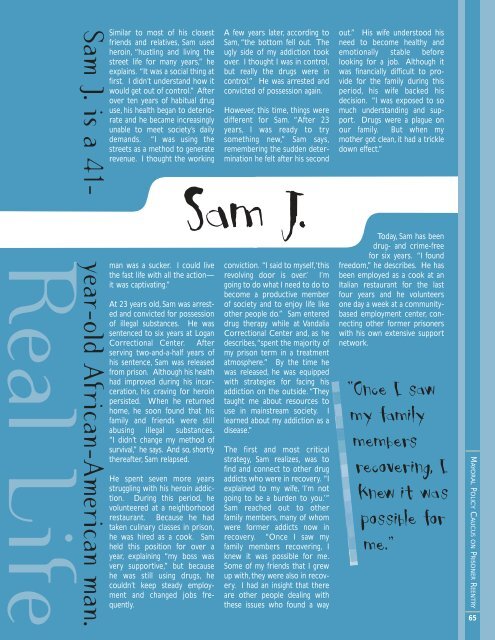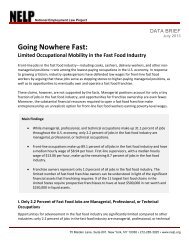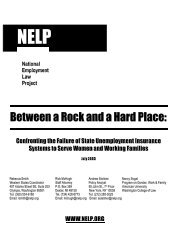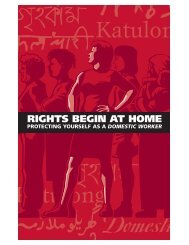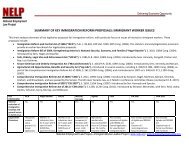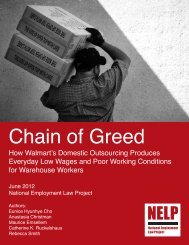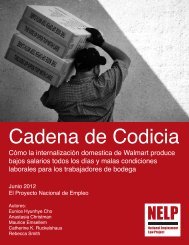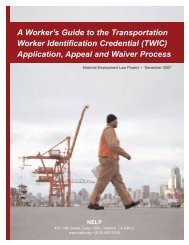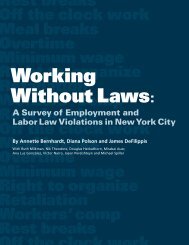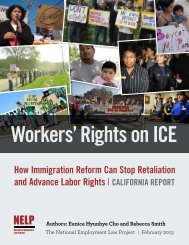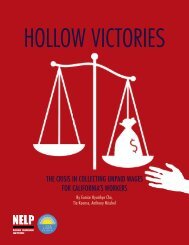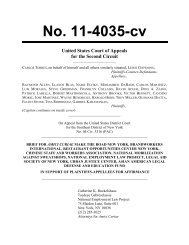Rebuilding Lives. Strengthening Communities.
Rebuilding Lives. Strengthening Communities.
Rebuilding Lives. Strengthening Communities.
You also want an ePaper? Increase the reach of your titles
YUMPU automatically turns print PDFs into web optimized ePapers that Google loves.
Sam J. is a 41-<br />
Real Life<br />
year-old African-American man.<br />
Similar to most of his closest<br />
friends and relatives, Sam used<br />
heroin, “hustling and living the<br />
street life for many years,” he<br />
explains. “It was a social thing at<br />
first. I didn’t understand how it<br />
would get out of control.” After<br />
over ten years of habitual drug<br />
use, his health began to deteriorate<br />
and he became increasingly<br />
unable to meet society’s daily<br />
demands. “I was using the<br />
streets as a method to generate<br />
revenue. I thought the working<br />
man was a sucker. I could live<br />
the fast life with all the action—<br />
it was captivating.”<br />
At 23 years old, Sam was arrested<br />
and convicted for possession<br />
of illegal substances. He was<br />
sentenced to six years at Logan<br />
Correctional Center. After<br />
serving two-and-a-half years of<br />
his sentence, Sam was released<br />
from prison. Although his health<br />
had improved during his incarceration,<br />
his craving for heroin<br />
persisted. When he returned<br />
home, he soon found that his<br />
family and friends were still<br />
abusing illegal substances.<br />
“I didn’t change my method of<br />
survival,” he says. And so, shortly<br />
thereafter, Sam relapsed.<br />
He spent seven more years<br />
struggling with his heroin addiction.<br />
During this period, he<br />
volunteered at a neighborhood<br />
restaurant. Because he had<br />
taken culinary classes in prison,<br />
he was hired as a cook. Sam<br />
held this position for over a<br />
year, explaining “my boss was<br />
very supportive,” but because<br />
he was still using drugs, he<br />
couldn’t keep steady employment<br />
and changed jobs frequently.<br />
A few years later, according to<br />
Sam, “the bottom fell out. The<br />
ugly side of my addiction took<br />
over. I thought I was in control,<br />
but really the drugs were in<br />
control.” He was arrested and<br />
convicted of possession again.<br />
However, this time, things were<br />
different for Sam. “After 23<br />
years, I was ready to try<br />
something new,” Sam says,<br />
remembering the sudden determination<br />
he felt after his second<br />
Sam J.<br />
conviction. “I said to myself,‘this<br />
revolving door is over.’ I’m<br />
going to do what I need to do to<br />
become a productive member<br />
of society and to enjoy life like<br />
other people do.” Sam entered<br />
drug therapy while at Vandalia<br />
Correctional Center and, as he<br />
describes,“spent the majority of<br />
my prison term in a treatment<br />
atmosphere.” By the time he<br />
was released, he was equipped<br />
with strategies for facing his<br />
addiction on the outside. “They<br />
taught me about resources to<br />
use in mainstream society. I<br />
learned about my addiction as a<br />
disease.”<br />
The first and most critical<br />
strategy, Sam realizes, was to<br />
find and connect to other drug<br />
addicts who were in recovery. “I<br />
explained to my wife, ‘I’m not<br />
going to be a burden to you.’”<br />
Sam reached out to other<br />
family members, many of whom<br />
were former addicts now in<br />
recovery. “Once I saw my<br />
family members recovering, I<br />
knew it was possible for me.<br />
Some of my friends that I grew<br />
up with, they were also in recovery.<br />
I had an insight that there<br />
are other people dealing with<br />
these issues who found a way<br />
out.” His wife understood his<br />
need to become healthy and<br />
emotionally stable before<br />
looking for a job. Although it<br />
was financially difficult to provide<br />
for the family during this<br />
period, his wife backed his<br />
decision. “I was exposed to so<br />
much understanding and support.<br />
Drugs were a plague on<br />
our family. But when my<br />
mother got clean, it had a trickle<br />
down effect.”<br />
Today, Sam has been<br />
drug- and crime-free<br />
for six years. “I found<br />
freedom,” he describes. He has<br />
been employed as a cook at an<br />
Italian restaurant for the last<br />
four years and he volunteers<br />
one day a week at a communitybased<br />
employment center, connecting<br />
other former prisoners<br />
with his own extensive support<br />
network.<br />
“Once I saw<br />
my family<br />
members<br />
recovering, I<br />
knew it was<br />
possible for<br />
me.”<br />
MAYORAL POLICY CAUCUS ON PRISONER REENTRY<br />
65


